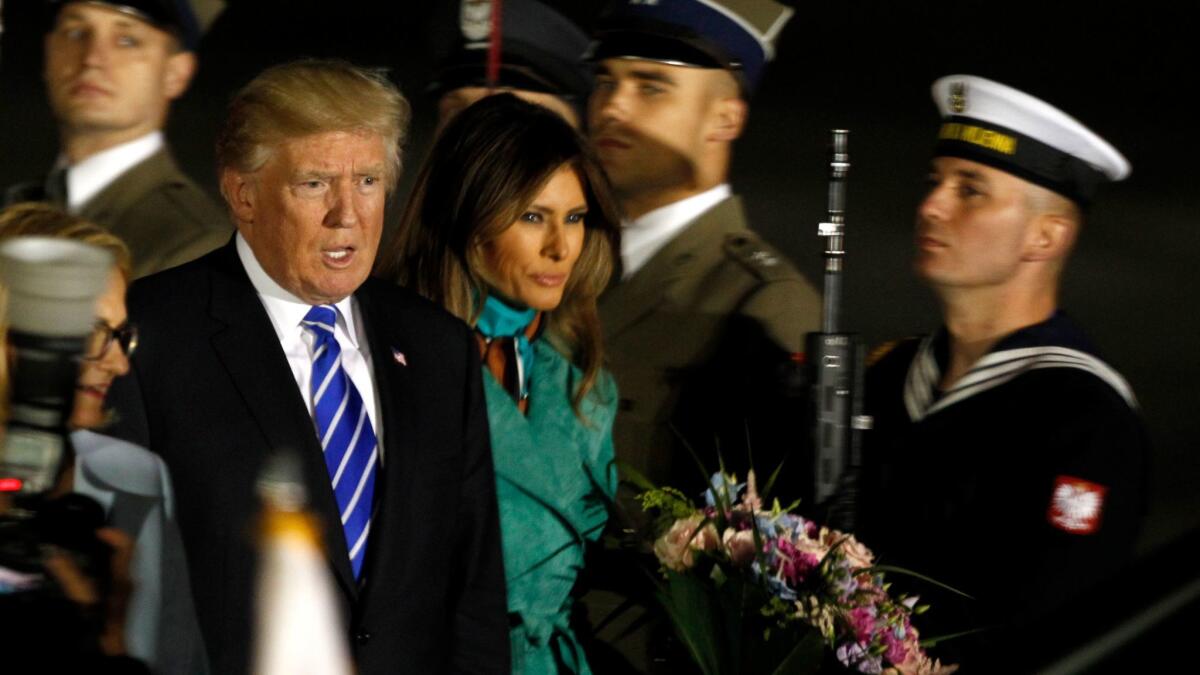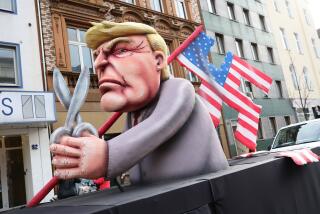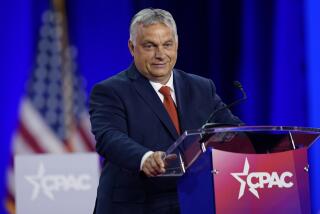In Poland, a right-wing, populist, anti-immigrant government sees an ally in Trump

Poland hasn’t really had a turn in the world spotlight since the 1980s, when all eyes were on the drama of the Solidarity labor movement’s perilous but ultimately successful struggle against Communist rule.
President Trump’s stop in Warsaw, where he arrived Wednesday night on his way to the Group of 20 meeting in Germany, focuses attention on a country viewed by many as having come full circle since those heady days.
Poland’s right-wing government views the visit as an enormous boost to its prestige, and has worked to ensure that Trump-friendly crowds turn out for a U.S. president known to relish shows of public adulation.
U.S. allies in Western Europe, however, worry that the president’s visit is in effect stamping a seal of approval on the Polish leadership’s aggressive moves against democratic institutions such as the courts and the news media, and that Trump could be seen as offering an implicit endorsement of the government’s populist, stridently anti-immigrant stance, which is reminiscent in some ways of his own.
Still colored in many ways by the sorrowful legacy of the 20th century, including the deaths of about one-fifth of its population in World War II, Poland has strong U.S. ties, personified by a large diaspora in the United States. While countries such as Ireland and Germany claim a far larger share of ancestral roots among Americans, Americans of Polish ancestry number nearly 10 million and have left an indelible mark on cities including Chicago and New York.
NATO ally Poland also hosts a contingent of about 900 U.S. troops, and has for many years contributed to U.S. and NATO missions in Iraq and Afghanistan. And it spends more of its GDP on military expenditures than most of its North Atlantic Treaty Organization neighbors, a subject Trump publicly lectured the alliance about during an awkward visit in May.
Trump’s public events in Poland were scheduled for Thursday.
Here’s some background about the first stop on Trump’s second international trip as president.
Who runs Poland?
Trump’s Polish counterpart, President Andrzej Duda, shares some common policy ground with the U.S. president, including prospects for energy deal-making, a shared mistrust of Muslim immigrants and refugees and a degree of disdain for the European Union. But the country’s most powerful political figure is Jaroslaw Kaczynski, the head of the nationalist-minded ruling Law and Justice party, which won 2015 parliamentary elections.
Under Kaczynski, the party has moved to rein in the judiciary, sought to muscle media outlets into taking a more pro-government line and advanced various conspiracy theories, including one surrounding the 2010 plane crash in Russia that killed dozens of Polish dignitaries including Kaczynski’s twin brother, Lech, who was then president.
What do Poles make of Trump?
It’s a more complicated question than the sight of cheering crowds — some of them bused in by backers of the governing party from outside Warsaw — might suggest. Within Poland, support for Trump tends to break down along urban-countryside lines, with less enthusiasm for his policies and rough-edged political style in cosmopolitan Warsaw.
In a recent Pew Global Attitudes survey, Trump’s ratings in Poland and neighboring Hungary were higher than in most of the rest of Europe, but still low in terms of his leadership qualities. According to the survey, only 23% of Poles trust the U.S. president to do the right thing in global affairs.
Still, Poland is seen by Trump’s entourage as far friendlier territory than Western Europe, where his relations with leaders like German Chancellor Angela Merkel and French President Emmanuel Macron have been strained over the decision to abandon the landmark Paris climate accord, among other issues.
What are Warsaw’s worries these days?
As in most countries, domestic issues like the economy are the biggest day-to-day concerns for most people. When it comes to foreign policy, the behemoth to the east — Russia — overshadows everything. Polish officials are keenly aware that they have Trump’s ear as he heads into bilateral talks with Russian President Vladimir Putin on Friday on the sidelines of the summit in Hamburg. Like all NATO allies that have Russia as a near neighbor, Poland has a keen interest in the degree of Trump’s commitment to the NATO alliance’s fundamental principle, which states that an attack on one is an attack on all.
Is Poland out of step with the rest of Europe?
In some important respects, yes. Its government has feuded with the European Union over a variety of topics, including immigration quotas and a fray over the government’s attempt to derail an EU leadership role for former Polish Prime Minister Donald Tusk, now seen as an adversary of the ruling party.
Poland’s leaders are thought to be using Trump’s visit to make at least symbolic inroads into Germany’s powerhouse status on the Continent. He will join in an event convened by Warsaw ostensibly to boost regional trade and infrastructure — the “Three Seas” initiative, but seen by some as a Polish-led bid to carve out a separate sphere of influence in Eastern Europe.
How have past U.S. presidential visits gone?
Warm receptions are the norm. Presidents Obama, George W. Bush and Clinton all made a point of meeting with Lech Walesa, the Solidarity leader who rose to the presidency. Walesa is considered an enemy by the current government, and there were no private talks with Trump on the agenda.
How has history shaped Polish attitudes?
Poland has a long and tragic history of being caught between powerful warring empires. Even before Poland’s oppression-haunted decades as part of the Soviet bloc, the country’s dead in World War II amounted to a staggering 6 million, about 20% of the prewar population. Outside recognition of past suffering is well received; Trump’s main public event is a speech in the capital’s Krasinski Square, near a monument to the 1944 Warsaw Uprising. The president’s national security advisor, H.R. McMaster, said in a pre-trip briefing that Trump would praise “Polish courage throughout history’s darkest hour, and celebrate Poland’s emergence as a European power.”
ALSO: When this broadcaster makes a rare appearance, North Koreans know it’s serious »
ALSO
Volatile Persian Gulf crisis over Qatar tries, divides Trump administration
Europe’s migrant crisis threatens to overwhelm Italy, even as flows to Greece dry up
More to Read
Start your day right
Sign up for Essential California for news, features and recommendations from the L.A. Times and beyond in your inbox six days a week.
You may occasionally receive promotional content from the Los Angeles Times.






